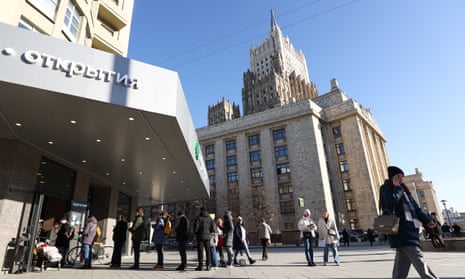Russia’s economy is expected to plunge into a deeper recession than the one caused by Covid-19 as a result of western sanctions and the country’s increasing isolation after invading Ukraine.
Economists said measures imposed on Russian banks and companies by the US, EU, UK and their allies were having a severe impact on financial markets in Moscow and would inflict more damage on Russia’s wider economy over time.
With tougher sanctions under consideration in western capitals as Vladimir Putin gathers troops closer to the Ukrainian capital, Kyiv, after a week of conflict, analysts at Goldman Sachs said the investment bank had cut its forecast for Russian gross domestic product this year from 2% growth to a 7% decline.
Russia’s economy was estimated to have grown by 4.5% last year after having shrunk by almost 3% in 2020, the worst year of the pandemic for the global economy.
Analysts said the Ukraine war may have a limited impact on the global economy because trade links between Russia and the rest of the world were limited, with the country accounting for 1.5% of global GDP, and for 2.9% and 0.9% goods exports from the eurozone and Britain respectively.
However, the invasion has triggered a surge in global energy prices – threatening to exacerbate a cost of living squeeze in several countries, including the UK. The war comes as the global economy is still recovering from the pandemic.
Oil prices rose on Wednesday to more than $111 a barrel, the highest level since 2014, as the prospect of disruption in supplies from Russia sent energy markets surging further. Russia is the world’s second biggest oil exporter and its largest in natural gas.
Should recent increases in oil and gas prices be sustained, economists forecast higher inflation will hit households and businesses, and trigger a slowdown in economies across the world.
Analysts at the consultancy Oxford Economics said the pressure on Russian financial markets would damage Russia’s GDP significantly, by as much as 6% relative to a pre-crisis forecast in a “plausible downside scenario”.
The economic repercussions for Ukraine, as it suffers massive infrastructure damage and disruption from the Russian bombardment, is expected to be worse still, with evidence from previous war-hit countries suggesting a slump of up to 60% could be possible. Eurozone and UK GDP could be about 0.5 percentage points lower than previously expected owing to the impact from soaring gas prices.
However, the analysts warned that a war lasting into 2023 with tougher sanctions from western governments and Russia retaliating by restricting gas supplies would cause a sharper fall of 7% in Russian GDP next year.
Innes McFee, chief global economist at Oxford Economics, said the hit to jobs and growth was difficult to forecast given the rapid changes in the conflict. “This is not a worst-case scenario. More severe conflict scenarios are possible. But we regard this downside scenario as a relatively high probability for how the economy could deteriorate in the event of a more protracted conflict.”
